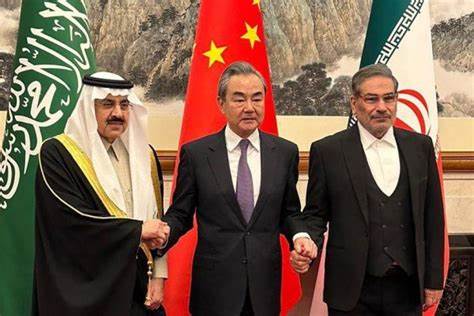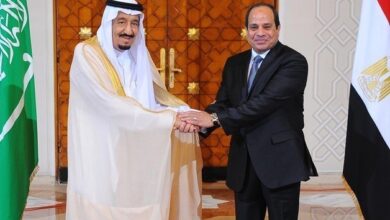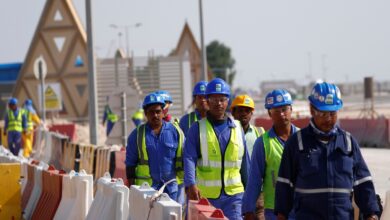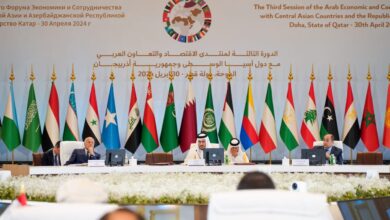
An expert of Chinese affairs
After the West began withdrawing tails of failure globally and in the Middle East due to the so-called war against terrorism, but actually for others’ resources such as the oil, etc and commiting unequivlant policies towards their friends as they assume.. Among their failure in the region is making full use of the Palestinian Issue, just for their benefits. So, It seems that the hot events and developments witnessed by many countries of the world, specifically the Middle East region during the first quarter of 2023, indicate that this year will bring many political, economic and diplomatic surprises that will clearly affect the world and the region, especially after the The year 2022 has pivotal events, such as the Russian / Ukrainian war (February), US President Joe Biden’s tour in the Middle East (July), Nancy Pelosi, then Speaker of the US House of Representatives, visiting Taiwan and the US attempt to ignite war with China (August). Demonstrations and protests in Iran (September), in addition to the visit of the Chinese President, Xi Jinping, to Saudi Arabia, in December 2022, which witnessed the holding of three summits, namely the Arab-Chinese summit, the Chinese-Gulf summit, and the Chinese-Saudi summit, in addition to multiple meetings at the bilateral level. The visit of Xi, the strong man of China – who was re-elected for a third presidential term in March 2023 – represented a strong and watershed point in the history of Arab-Chinese relations, and I believe that both the Arab and Chinese sides will seek to benefit from the development of close relations, especially in the framework of the “Belt and Road” initiative that coincides with This year marks the tenth anniversary of its declaration by President Xi in 2013, in which 150 countries have participated so far.
In a move that seemed surprising to many, the announcement of the statement of restoring Saudi-Iranian relations with Chinese cooperation and initiative came a few hours after the start of President Xi’s third term, in a clear indication that China, with its new diplomacy, now has something to offer on a number of international issues and an affirmation that it is keen on This trend is to support its presence in the Middle East, and in particular the Arab region, and also to confirm that the new China is striving diligently to develop its relations with the countries of the region, and in accordance with the Chinese principles that were mentioned in China’s document towards the Arab countries issued in January 2016, in which it was stated ((..China is committed to developing its relations with Arab countries on the basis of the five principles of mutual respect for sovereignty and territorial integrity, non-aggression, non-interference in internal affairs, equality and mutual benefit, and peaceful coexistence. It stands by the Middle East peace process and supports state building An independent Palestinian state with full sovereignty on the 1967 borders with East Jerusalem as its capital, and supports the efforts made by the League of Arab States and its member states in this regard. K to resolve hot issues in the region through political means and supports the establishment of a zone free of nuclear weapons and other weapons of mass destruction in the Middle East, as well as the unremitting efforts made by the Arab countries to strengthen solidarity and put an end to the spread of extremist ideas and combat terrorism and others. China respects the choice of the peoples of the Arab countries, and supports the efforts of the Arab countries in exploring development paths that are commensurate with their national specificities with their independent will, with the hope of increasing the exchange of experience with the Arab countries regarding the governance and administration of the country).
Returning to the file of restoring relations between Riyadh and Tehran, we find that Beijing has made a great diplomatic effort through secret sessions in which some Arab countries participated, especially since China has good relations with Iran, as it received last February the Iranian president in Beijing, and the two countries are bound by a strategic partnership agreement for a period 25 years signed in March 2021.
This cooperation between China and the countries of the region comes despite the American reservations, especially since the Chinese-Arab rapprochement may not appeal to the American mood, as Washington sees it as the guardian of the region and always seeks to intimidate countries from using Chinese technology and from cooperation and investment with experienced Chinese companies, which have become It has a major role in many fields such as infrastructure, communications, space science, high-speed trains, the automotive industry, and others, given that any cooperation with China is a threat to US national security.
Undoubtedly, Washington will seek to counter the growing cooperation with Beijing, and the United States is likely to create some problems, such as stirring up some unrest in the countries of the region and trying to spread scarecrows of fear and Iranophobia. It may also seek to harass China by interfering in its affairs. And work to encourage and stir up the separatist tendency of Taiwan, and raise problems such as the issue of dropping the balloon, despite what the Chinese Foreign Ministry stated that this balloon is for weather operations and other methods that have become known to all.
Perhaps it is appropriate at this time to remember the American invasion of Iraq, which twenty years passed on the 20th of March, which was a ruin and a disaster not only for Iraq and its people, but for the Arab region as well, and that was under the pretext that Iraq possesses weapons of mass destruction and poses a threat to international peace. Although most countries refused to support military action, the United States violated the purposes and principles of the Charter of the United Nations and the basic rules of international relations and unleashed war, and created internal divisions in Iraqi society artificially and clearly, and waged the war without evidence and the validity of what was mentioned by the American intelligence has not been proven until now.
The inescapable fact is that Washington lost much of its credibility in this war, and many American analytical readings indicated that the American war on Iraq – due to which Washington and Baghdad lost many, many lives and money – was driven by an American pro-Israel lobby. Some pointed out that the administration of President Bush Jr. launched this war because of its need for Arab oil, or With the aim of “exporting democracy” to the region, and also under the pretext of preventing terrorist organizations, especially “al-Qaeda”, from obtaining “alleged” weapons of mass destruction from the Republic of Iraq, and after twenty years, Iraq has never been proven to possess weapons of mass destruction. It is strange that after twenty years of war on Iraq and the total devastation that befell this country, we find Washington calling for holding the second democracy summit at the end of this March with the aim of exporting and transferring democracies to the countries of the world.
In fact, what the world needs today in light of artificial or natural disasters is not a summit in order to transfer the templates of democracy, but rather effective summits and conferences that focus on peace and work to find solutions to many crises and take real measures to solve global problems and challenges in all fields, whether economic, environmental or other.
In addition to the failures and disasters that resulted from Washington’s policies in the region for the countries and peoples of the region, as is the case in the Iraqi model, Washington apparently did not learn the lesson, as it finds itself in a new predicament, due to the hot events the world is witnessing as a result of the Russian war / This led to the US administration seeking to use pressure tools on Saudi Arabia to reverse its decision to produce oil, and Washington threatened to use many pressure cards, including a review of relations with Saudi Arabia.
On the other hand, China adopts a new foreign policy based on upholding the values of peace and renunciation of war. The Chinese initiative to resolve the Russian/Ukrainian crisis consisting of 12 items was put forward, and the Chinese president visited Russia, in an effort on his part to resolve the matter and try to resolve this crisis. As a result of the principles and constants of China’s foreign policy, from the beginning, China did not support the Russian invasion of Ukraine, but at the same time it announced its understanding of Russia’s concerns related to its national security.
In sum, the year 2023 is witnessing a new China.. It set out to play the role of (the maker and sponsor of international peace), and the beginning was in the initiative between Iran and Saudi Arabia, and now the initiative to solve the Russian-Ukrainian crisis, and these initiatives reflect the peaceful and cooperative orientation of China, which must be reciprocated by On the side of the United States, in order to find a way to coexist with other poles such as China. The region is waiting for the new China to work to contribute to finding solutions to many important issues in the region, such as the Palestinian issue and the issue of the Ethiopian dam.
Hence, an important question must be asked, the answer to which is expected to appear within the next two decades:
Will “Peace… Made in China” become Beijing’s next slogan?
Does anyone doubt that “Made in China”.. A hopeful Industry of CHINA as a Promising Peace-Player?!





